

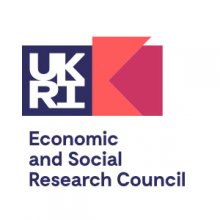
Festival of Social Science 2021
2021 saw us deliver a month of events for the first time! From 1 -12 November our events aligned with COP26, exploring themes of climate change and the environment. Thereafter we explored a variety of societal topics and challenges, some big some small, but all relevant to public audiences young and old.
We had over 1500 attendees and 98% of those surveyed agreed the events were worth the time and effort of attending. 87% are keen to find out more about the topic and plan to share what they've learned with others.
Festival programme
Take a look through the programme below for more information and links to event recordings.

Host: Claire Mascall, Post Graduate Researcher, Centre for Environment and Sustainability, University of Surrey.
At a time when the provision for environmental awareness for young people should be at an all-time high, opportunities for young people to develop environmental understanding, to connect with nature and to act to address environmental problems remain limited. While the popularity of outdoor learning and green schools continues to rise in primary education, secondary schools still face significant barriers to engaging young people with their environment.
This event springboards from the idea that there exists a moral obligation to empower young people and provide them with opportunities for climate action, to learn for sustainability and to re-connect with nature in supported, adult-guided contexts.
Attendees were invited to bring their experiences and personal perspectives to engage in a creative workshop and develop research-based ideas on inspiring opportunities for young people. Teachers, outdoor and environmental education instructors, young people, parents and anyone with an interest in the area were invited to attend.
The event explored diverse education and learning environments and the role that adult leadership plays in these contexts. Topics included nature experiences for young people and how these might – or should – differ from the experiences of younger children, how the characteristics of green space might impact young people’s experience (i.e. urban, wild or community gardens for example), and how teaching practice can engage and motivate young people in environmental action.
Following an overview of the Environmental Citizenship project based at the University of Surrey, attendees were encouraged to think about and discuss the significance of green spaces and the potential for improving connections with nature, as well as the difficulties faced in providing high quality environmental learning for young people. The event included video clips and a hands-on creative activity to inspire discussion. The aim of the session was to bring different perspectives together and to connect attendees to a wider network of people interested in environmental understanding for young people.
If you missed the event you can watch it on our YouTube channel.

Host: Dr Emily Corrigan-Kavanagh.
The event emphasised the significance of creating technologies to support future homes for wellbeing, such as through Artificial Intelligence (AI), through a series of poster and technology demonstration pitches, organised tours to the MyGlobalHome Innovation Centre and an expert panel discussion. There was also the opportunity for attendees to pose their questions to a panel of experts on how new, sustainable technologies can be adopted in the home, and the particular wellbeing benefits that might be welcomed from home tech in years to come. The event ended with a soft drinks reception, providing additional time for attendees to discuss thoughts and ideas to demonstrators, poster presenters and speakers surrounding what is important to them when it comes to technology usage at home.
The event highlighted the importance of designing sustainable technologies that induce wellbeing in the home environment, and the kinds of technology, including Artificial Intelligence (AI) that might be possible in future. We discussed the potential for connecting information and understanding to create homes that look after their occupants and not the other way round! We looked at how to improve communication between the different smart technologies present in people’s homes, which can offer targeted insights for a broad range of health conditions. Beyond implementing smart devices that can monitor and automate, we sought to create environments that are able to analyse context-rich data to provide more valuable insights. This will be incredibly helpful in monitoring anything from serious underlying health conditions to general fitness in home occupants.
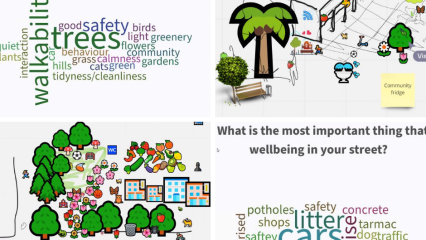
Hosts: Professor Birgitta Gatersleben, University of Surrey, Dr Eleanor Ratcliffe, University of Surrey, Dr Melissa Marselle, University of Surrey.
This interactive online event gave audiences an opportunity to think about how they would re-imagine their local neighbourhood to be healthier and more sustainable.
Despite our hopes, the COVID-19 pandemic has restricted movements outside the home for a significant portion of yet another year. It is a time when we changed a lot of our behaviours and spent a lot of time close to the home, walking on our local streets or maybe taking up cycling for the first time in many years. As we make this move back to normality, it is a perfect time to reflect on how our relationship with our neighbourhood streets has changed and how we can learn the lessons of this pandemic to build back better.
The audience heard short talks about the various ways city streets can influence our health and contribute to environmental sustainability from members of the Environmental Psychology Research Group at the University of Surrey. After this, they engaged in an online workshop activity where, in groups, they designed the most healthy and sustainable neighbourhood you can imagine.
The event aided discussion about the design of our city streets and how it influences our day-to-day experiences and behaviours. Some streets may discourage health behaviours that would benefit the person and the environment, like walking and cycling.
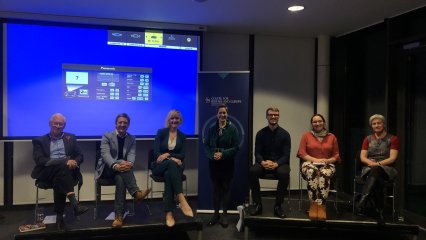
Hosts: Professor Amelia Hadfield, University of Surrey (Panel Chair) and Dr Alia Middleton, University of Surrey.
Panel speakers
- Professor Graham Miller - Pro-Vice-Chancellor and Executive Dean of the Faculty of Arts and Social Sciences, Professor of Sustainability in Business, University of Surrey
- Katie Stewart - Executive Director for Environment Transport and Infrastructure, Surrey County Council
- Philip Riley - Vice-President of The Basingstoke Canal Society
- Dr Erica Russell - Doctoral Practitioner, Centre for Environment and Sustainability, University of Surrey
- Will Hitt – Undergraduate Student and President of the Politics Society, University of Surrey.
With COP26 highlighting the rising prominence of the environment and sustainability on the political agenda, this collaborative event between the Centre for Environment and Sustainability and the Centre for Britain and Europe showcased cutting-edge research on climate action and the transitions needed for Net Zero and wider sustainability.
This event built on recent county-wide policy commitments (Surrey County Council’s climate plan and Greener Surrey strategy; the new Surrey Climate Commission; the University’s Net Zero plans amongst others) to explore what it will take to engage the whole community of Surrey – citizens, businesses, public bodies and NGOs – in decisive action on the linked climate and nature crises. Drawing on expertise in policy, polling and community, the panel offered vital insights into policy implementation and public responsiveness. It emphasised the ongoing deep commitment the University of Surrey has to understanding societal impact and community leadership.
At a time when the UK was hosting a major global conference on Climate Change, COP26, this workshop aimed to pick up on topics under discussion and includes a bitesize appraisal of what has been discussed, the salience of the UNCC and likely steps the Government will take going forward. The workshop targeted a wide section of the community including those actively engaged in the local environment, but crucially those who understand the roles and responsibilities of the local community in changing society. The audience heard first-hand about research being undertaken by the Centre for Britain and Europe and the Centre for Environmental Studies, in vital areas of sustainability against a backdrop of local, national and international discussions on sustainability.
Host: Dr Nikolas Thomopoulos, School of Hospitality and Tourism Management.
The Ready2Drive project at The University of Surrey aims to address the attitudes of individuals aged 60+ about driver training needs as people get older. This proof-of-concept research is developing testing and evaluating relevant scenarios through a video survey, distributed in the UK. Its academic contributors come from the Department of Tourism and Transport, The Digital Lab, DIGMY, the Faculty of Health and Medical Sciences and Nervtech, who are working on the simulation algorithms for the project. We invited members of the public aged 60+ to participate in our online video survey, and they then joined us for a focus group to give their feedback, along with other members of the public who were interested to learn more about these technologies, and our findings.
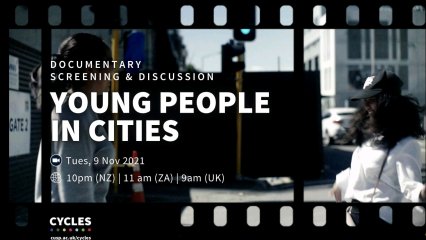
Host: Professor Kate Burningham.
Hosted by the University of Surrey (UK) in partnership with Canterbury University (New Zealand) as part of the 2021 ESRC Festival of Social Science—this event offered audiences an opportunity to watch the preview of two new short films which gave insight into young people’s lives in Christchurch, New Zealand and Makhanda, South Africa and to talk to the film director and research project leads.
The films were made by award winning filmmaker Amanda Blue to accompany the international CYCLES project which is running in the Centre for the Understanding of Sustainable Prosperity (CUSP).
The project is working with young people aged 12-24 across seven international cities, discovering the issues that are important in their ability to live well and sustainably in urban environments.
Amanda’s films are an accessible and compelling introduction to some of the concerns and priorities for young people in Christchurch and Makhanda and provide an inspiring basis for a wider discussion with the audience about what’s needed to enable young people to live well within urban environments.
Cities are at the fore of sustainability challenges of the twenty-first century, and many are predominantly youthful spaces. Understanding young people’s experiences in urban environments is therefore important as we strive to achieve both the Sustainable Development Goals and the Paris Agreement.
The international CYCLES project seeks to understand the lifestyles and aspirations of young urban residents and to share their ideas for living well within environmental limits. CYCLES research is taking place in London, UK; Christchurch, New Zealand; Dhaka, Bangladesh; New Delhi, India; Sao Paulo , Brazil; Makhanda, South Africa and Yokohama Japan.
For enquiries, please email events@cusp.ac.uk. Follow the CYCLES project with #YoungLives7Cities on Twitter.
You can watch the recording of this event.

Hosts:
- Professor Melissa Hamilton, Professor of Law & Criminal Justice, University of Surrey School of Law
- Noël Busch-Armendariz, University Presidential Professor, The University of Texas at Austin
- Steven Hicks School of Social Work Partnering with the Institute on Domestic Violence and Sexual Assault
- Dr Christine Barter, Professor of Interpersonal Violence Prevention, University of Central Lancashire
- Margaret Bassett, Director of Applied Research & Innovative Instruction, The University of Texas at Austin
- Caitlin Sulley, Director of Research and Operations, The University of Texas at Austin.
This workshop provided innovative information and tools to enhance coordinated efforts towards assisting victims of sexual assault while holding offenders accountable. The audience heard from experts in the field on best practices in criminal justice and community engagements with sexual assault cases and we showcased video clips from a professionally developed series of educational videos to further promote key messages.
The event explained common impediments to properly evaluating and responding to allegations of sexual assault. Attendees received information to assist them in better understanding common tactics of perpetrators and the reasons victims may not act as one might as expect. We discussed how to assess whether consent was fully and voluntarily given, offered guidance on how to assess the role of alcohol and drugs, and provided advice on how potential victims and their supporters can navigate issues of assessing safety if attempts are made to end the relationships.
We explored how the neurobiology of trauma can explain confusing behaviour along with common tactics in selecting vulnerable victims and hiding evidence. The workshop aimed to improve understanding and mutual response to sexual assault for members of public in the community, community organisations, academic experts, authorities, and justice professionals, and offered proven suggestions on workable solutions.
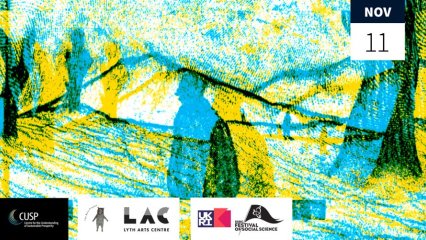
Host: Dr Malaika Cunningham.
This event—hosted by Lyth Arts Centre in partnership with The Bare Project and CUSP at the University of Surrey (UK) as part of Creative Carbon Scotland’s Climate Beacons for COP26 and linked into the 2021 ESRC Festival of Social Science— was designed for local people in the Caithness area, who are interested in land justice, the role of language in our relationships with land, and contemporary performance.
What does a reciprocal relationship with land look, smell, feel, sound like? If we try to move beyond ownership and extraction—or even conservation—how do we then relate to the hazel-shaws, aps’tgu’j, and móinéar**?
Whilst the COP26 conference was in full-swing in Glasgow, The Bare Project (a theatre and interactive arts company) together with CUSP met at Lyth Arts in Caithness, the UK’s most northerly mainland arts centre, to understand ancient relationships with land that may help guide our future.
We worked with crofters, linguists, a herbalist, academics, a filmmaker, and a fiddle player to get to grips with the languages of land that have been all-but lost to British colonialism, and post-industrial capitalism.
This installation was part of a broader project called The People’s Palace of Possibility, a long-form arts and permaculture project which took off via the postal service during the lockdowns of 2020, and will culminate in a community-owned food forest in South Yorkshire.
The live audience were invited to explore the many rooms of The People’s Palace of Possibility, each with a different invitation for conversation or play. The piece featured an audio artwork including the voices of local people on the theme of their relationships with land. As part of the installation we also shared a meal created from locally grown and foraged ingredients.
A film screening of this creative project will be made available in February 2022.
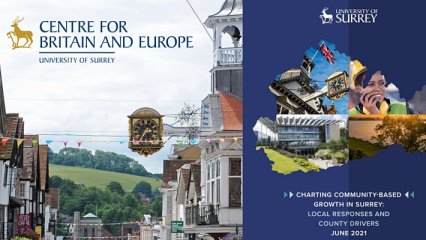
Hosts:
- Professor Amelia Hadfield, University of Surrey
- Dr Alia Middleton, University of Surrey
- Stakeholders from Surrey local government
- Key local decision makers
- Community representatives.
In a post-Covid environment there is a profound need to understand how Surrey as a county is going to evolve. This event launched the 'Charting Community-based Growth in Surrey' report from the University of Surrey's Centre for Britain and Europe. The event expanded on this highly acclaimed report into the local area, the role of growth and its different definitions and applications, and why growth needs to be genuinely community based.
There is a real appetite amongst decision makers to hear what the local community think. The pandemic has made us look afresh at the special qualities and strengths of Surrey, including its people, communities, economy, natural environment, globally significant location, clarifying how we can continue to grow, and remain successful, attractive and competitive, nationally and globally. This event harnessed the value of this report by discussing with the public how we should choose to collectively use it, and translate it into actual delivery.
Surrey County Council, and a number of local and national decision makers considered the county's future journey in rejuvenating the high street, developing employment and skills, ensuring inward investment, and growing the green economy. The event engaged with the challenges of health and wellbeing in all areas of the county. We discussed how to implement the key opportunities identified for fostering a place based localism for our community. The audience had the opportunity to engage with our panel of guests and give input to the issues raised.
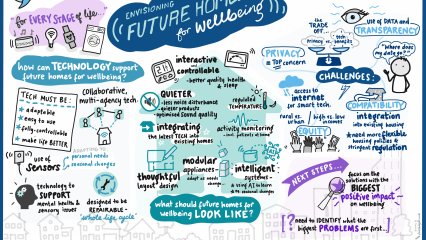
Host: Dr Emily Corrigan-Kavanagh.
This online event gave audiences an opportunity to shape what future homes for wellbeing might look like by contributing to a “world café” style online discussion session. Topics from emerging conversations were then recorded as a beautiful digital visual by a graphic artist and sent to all attendees to bring together and commemorate everyone’s contribution.
We kicked off with a short presentation of innovative technologies for home wellbeing to inspire follow-up conversations on “What should future homes for wellbeing look like?” and “How can technology support future homes for wellbeing?” with other attendees in small Breakout Room groups.
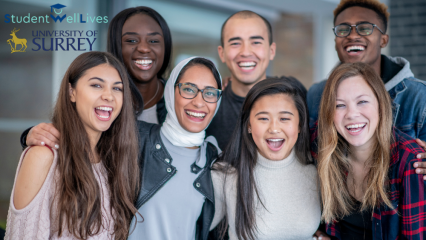
Hosts:
- Dr Kieran Balloo, Research Fellow in the Surrey Institute of Education at the University of Surrey and Co-Investigator of the Student Wellbeing and Life Outcomes Project
- Dr Anesa Hosein, Senior Lecturer in the Surrey Institute of Education at the University of Surrey and Principal Investigator of the Student Wellbeing and Life Outcomes Project.
Thinking about going to university next year, or maybe you have just started? Have you thought about your mental wellbeing? Have you thought about how your university environment might affect your mental wellbeing? Have you thought about how your social identities may also contribute to your mental wellbeing at University?
In this FOSS event we explored these issues with researchers from the Surrey Institute of Education investigating these questions in our ‘Student Wellbeing and Life Outcomes Project’ (#StudentWellLives), which has been funded by the Economic and Social Research Council (ESRC).
The workshop focused on the possible reasons why different students experience mental health issues, and how they can get better support during their time at university. This was an interactive event appealing to prospective students, current students, and their parents or guardians.
We hosted the event using an interactive platform called Gather Town, designing a virtual space simulating different university types to encourage the audience to reflect on the role of the university environment in students’ wellbeing.
In one of the activities at the event, participants were shown video clips of hypothetical stories of young people entering university. Working in groups, they then chose how to complete these hypothetical journeys of mental wellbeing, such as through a performance, a story chain, or a drawing.
We came together and discussed how these hypothetical students’ lives might be enhanced through making different decisions as they progress through university.
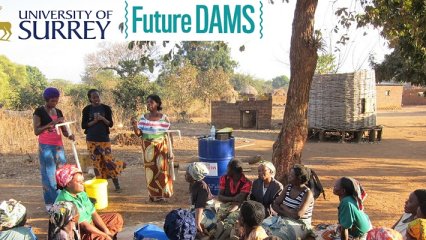
Hosts:
- Dr Kavin Narasimhan, Research Fellow (FutureDAMS), University of Surrey
- Dr Roshan Adhikari, Research Fellow (FutureDAMS), University of Manchester
- Sarah Redicker, Doctoral Student (FutureDAMS), University of Manchester
Governments, corporations, and businesses around the globe must act quickly and unwaveringly to tackle climate change. Simultaneously, the role of citizens and communities in empowering climate wise sustainable development is also important but often overlooked or implemented poorly.
A case in point is community-based water management (CBM), which aims to allow end users to manage and share water resources equitably, effectively, and sustainably. CBM is central to effective water resources management irrespective of political ideologies and yet, studies show that very few models have achieved sustainable success.
Communities are the backbone of our nations. They have a central role in the global fight against climate change. And yet, communities seldom have the support, training and inputs necessary to manage and use resources sustainably.
Our online event brought together international researchers, water management experts and community representatives to explore what types of shocks affect community-based water management, what adaptation and mitigation measures are needed to manage shocks and restore stability, who are the external actors (Governments, civil society, NGOs, donors, etc.) and what can they do to equip communities to manage shocks. It was dubbed by one speaker to offer, "The detail that was not discussed at COP26."
You can watch the event online to explore the important topics shaping the role of citizens in the global fight against climate change.
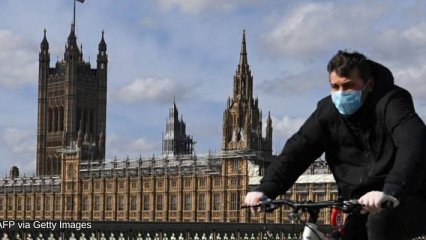
Hosts:
- Professor Amelia Hadfield, University of Surrey.
- Dr Steven van Hauwaert, University of Surrey.
- Dr Theofanis Exadaktylos, University of Surrey.
- Professor Tim Bale, Queen Mary University of London.
- Professor Ryan Carlin, Georgia State University.
The Covid-19 pandemic has had worldwide implications but the impact of this particular public health crisis is different to other recent crises the world has faced, as it goes beyond that of a sanitary or health crisis. The pandemic is a multifaceted and pluridimensional crisis, impacting on employment, the welfare state, immigration, economic growth, party political relations, the prevalence of polarisation and extremism, inequality and many more social, political and economic aspects of contemporary society.
Key speakers from the Department of Politics at the University of Surrey gave a set of presentations that highlight how local, national and international political actors responded to various aspects of the COVID-19 crisis.
The event focused on topics such as; how policy responses to the pandemic developed in the UK compared with the rest of the world, how populist actors in the UK and Europe responded, how a pandemic affects government approval ratings and the challenges local policymakers faced, particularly in Surrey.
In addition, we shared our findings regarding populist responses to the pandemic such as how it affected Boris Johnson's approval ratings. This latter exercise, through the use of an interactive online tool, stimulated younger audiences, showing that 'playing with data' can be fun and politically relevant.
Those joining this event left with a number of key take-away messages and an understanding of how political science research is socially and societally relevant. We emphasised that even in times of crises not directly related to politics, the social and political implications are widespread and important to examine.
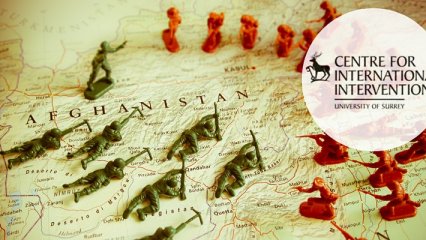
Hosts: Dr Nick Kitchen, University of Surrey and Alex Leveringhaus, University of Surrey.
This event will focus on the future of international intervention in light of the US’ withdrawal from Afghanistan this summer, as well as the rise of post-liberal politics in western states more generally.
The panel will include several academics from the University of Surrey's Centre for International Intervention, and policy practitioners who have researched and worked intervention since the late 1990s. They will reflect on what many feel went wrong in Afghanistan, as well as the prospect for international intervention going forwards. There will be plenty of opportunity for the audience to ask questions and contribute to this ongoing and very topical debate.
The US withdrawal from Afghanistan and the country’s subsequent fall to the Taliban in the summer of 2021 has thrown long-standing questions about the pros and cons of US-led interventionism into sharp relief. Although dissatisfaction with intervention has been brewing for a while, the fall of Kabul seems to symbolise the end of an era. That is, an era where humanitarian and counterterrorism goals became intertwined in a somewhat unhappy liaison and where the stabilisation and reconstruction of authoritarian post-conflict societies became an important policy goal.
But why did the Afghanistan mission fail? Were there arguments in favour of propping up the Afghan government? Do the scenes from Kabul airport mean that states will think twice about intervening? Or will they merely change their methods, relying on new technologies at their disposal (such as drones)? Will questions about international intervention be increasingly replaced by concerns for Great Power confrontation between the USA and China? Or will arguments about intervention become intertwined with Great Power competition – just as intervention became intertwined with the Bush administration’s War on Terror two decades earlier? What does all of this mean for post-Brexit Britain’s desire to remain an important regional and global military player?
These and similar questions were up for debate as part of this timely and interactive online event. Participants enjoyed a lively and engaging debate between experts on foreign policy, intervention, and humanitarianism, with plenty of scope for the voicing of audience opinion.
You can watch the event online via the website of the Centre for International Intervention
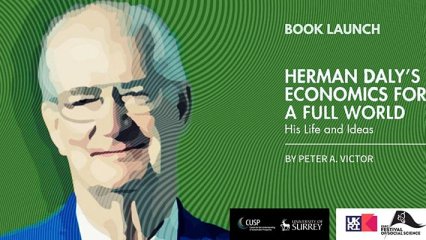
This event, hosted by the University of Surrey (UK) in partnership with York University (Canada) as part of the 2021 ESRC Festival of Social Science launched Peter Victor’s new book on the life and work of Herman Daly.
Speakers: Herman Daly, Peter Victor, Katherine Trebeck, Ellie Perkins and Tim Jackson.
The USA and UK, like so many countries, face a grave dilemma: how to regain pre-pandemic levels of economic activity and growth while reducing the already excessive environmental impacts of climate change, ocean acidification, biodiversity loss, and contamination of air land and water. The ‘code red alert’ of the most recent IPCC report on climate change exemplifies the seriousness of these problems but it is only one of several globally significant environmental threats crying out for attention. The dilemma is that a return to unending economic growth, especially in advanced economies, is unlikely to be the answer.
Herman Daly is one of very few economists who has devoted his entire career to resolving this dilemma. His economics for a full world has been widely recognised through numerous national and international prestigious prizes and awards. His pathbreaking work on the steady-state economy provides the foundation for new approaches to economics finding favour especially among younger people such as well-being economics, doughnut economics, post-growth economics and degrowth. Daly, born and raised in southern Texas is admired for the clarity of his thinking and expression as well as his kindly manner. He is a founder of ecological economics which views the economy as embedded in and entirely dependent on the biosphere. Nothing in economics could be more relevant to advancing our understanding of and finding solutions for the climate crisis and sustainability.
You can watch this event online.

This event—co-hosted by CUSP at the University of Surrey (UK) and Artsadmin, in partnership with The Bare Project and Lyth Arts Centre, as part of the 2021 ESRC Festival of Social Science, was designed for people who are interested in land justice, the role of language in our relationships with land, and arts-based approaches to research and activism.
Whilst the COP26 conference was in full-swing in Glasgow, The Bare Project (a theatre and interactive arts company) and CUSP spent two weeks in the Highlands at Lyth Arts in Caithness, the UK’s most northernly mainland arts centre. Together with local crofters, foresters, artists, and young people, they questioned our ancient relationships with land, and how those relationships could help guide our future. While they were up there they discovered four giants, inspired by folklore, but created out of conversations and research into the more-than-mortal forces that control and shape our landscapes.
At this roundtable the audience met these four giants, heard their stories, and discussed how we can ourselves become giants, capable of building new, sustainable, and just landscapes. What do we need to play a more-than-mortal role in our landscapes? We also showcased some early cuts of a film created on this subject with filmmaker Regina Mosch.
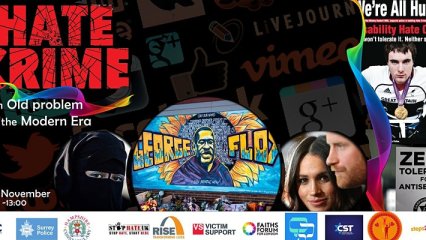
Host: Moslem Boushehrian, University of Surrey.
Partners:
- The National Police Chiefs’ Council (National Hate Crime Problem)
- Surrey Constabulary (Hate Crime in Surrey)
- Hampshire Constabulary (Hate Crime Against Public Sector Staff)
- Stop Hate UK (Helpline and Support)
- Victim Support (Gaps in referral and support for victims of hate crime)
- CST (SAFE) (Securing and protecting minority community spaces)
- Rise Mutual (Restorative Justice)
- Solution Not Sides (Combating misinformation and promoting productive dialogue)
- Faiths Forum London (Combating hate crime through community cohesion)
- Refugym (Well-being Support for Refugees by Refugees)
- Stand Up! Education Against Discrimination.
This event discussed the boundaries of hate crime such as its national, local, and community impact, its harms and effects, and the available support and response for both its victims and offenders, as well as both current and future challenges.
What is considered a crime here and now may not be for another person in another place. Crime is socially constructed and hate crime is not an exception. The internet, social media and 24-hour news channels have wiped the geographic borders and barriers between different cultures, leading to the potential for people to do or tweet something that can be considered socially acceptable and normal no matter how controversial, and may cause outrage in another culture. This event explored how the development of media and exposure to it, can and has altered our understanding of what 'hate crime' is and we will explore various ways to collectively combat hate crime and support its victims.

Host: Dr Robyn Muir, Sociology, University of Surrey.
Princess culture shapes the lives and identities of girls and women, therefore the images we see are the only ones we can interpret. Understanding how children interpret these images is integral for creating change.
Dr Robyn Muir, from the Department of Sociology invited young children and their parents to reflect on representations of princesses in popular culture through an interactive activity online and explore important debates that arise from them.
The aim was to empower parents with their children to start to critically engage with the Disney Princess Phenomenon, along with wider media sources. Learning media literacy allows children to de-trivialise the trivial and build critical thinking skills. It also provides parents with a platform to critically engage with the content their children consume, together as a family.
This event explored what it means to be a princess. An icon in girl culture and wider childhood, princesses and their stories are a central part of development for children. With parents and children, Dr Robyn Muir from the Department of Sociology discussed what being a princess means, the qualities of a princess, and what that means for us as a society. Themes ranged from identity to body image, encouraging the building of media literacy skills. The event was held online on a Sunday to make it easier for families to attend along with a free gift posted to every child!
Dr Robyn Muir is a Lecturer in Media and Communications at the University of Surrey. Her research focuses on the images of femininity within the Disney Princess Phenomenon, focusing on how femininity has been constructed in film, merchandise, marketing, and consumer experiences. Her book, The Princess is the Political, is forthcoming with Bristol University Press and includes an in-depth feminist analysis of Disney Princess films, merchandise and consumer experiences. An avid Disney fan herself, Robyn uses her research as a platform to discuss important societal issues and encourage media literacy to empower consumers to demand change and diversity in the media industry.

Host: Dr Amy Burnett, University of Surrey.
The aim of this event was to deepen understanding of the relationship between politics and local governance that can affect sustainable outcomes. The session provided insights on how to reorientate local institutions towards environmental benefits and social wellbeing where these involve working with local councillors, planners or other community groups interested in positively shaping where they live. In particular, the event explored 'Flatpack Democracy', a local political movement that seeks to 'break the mould' of party-politics through the election of groups of independent councillors. We reflected on the experiences of Frome (Somerset) and other places replicating this approach and discuss the reasons for success and challenges in moving beyond party-political approaches. The event was informed by a survey carried out on the Flatpack 2021 National Campaign and research on stakeholder needs to monitor and evaluate climate and ecological emergencies. The session also aimed to inform debates on the future of politics and placemaking in the context of post-Brexit and post-Covid recovery and renewal.

Host: Dr Philip Jackson, CVSSP, University of Surrey.
Partners:
- Eleni Sharp, BBC Research and Development
- Professor Sabine Braun, University of Surrey
- Professor John Collomosse, University of Surrey
- Dr Jack Stilgoe, Associate Professor, University College London.
With an estimated five smart devices for every person on the planet, personal data and media have never been so readily accessible. Yet our personal experience of media, including social media, is for the most part mediated by a small number of global tech corporations.
Joined by BBC R&D, this panel explored digital rights, human values, trust and decentralisation as directions to advance society's ability, our ability, to shape the algorithms that feed our media. The session included presentations from speakers researching these themes and provide an opportunity for questions and discussion. It is hoped that their insights will enrich and inform a debate as part of society's ongoing conversation to design technologies for media personalisation that better serve the needs of society.
More and more data is available online, including our own personal data as our lives have become increasingly digital. Equally, the films, drama, music, news, sport and other entertainment we enjoy are in the throes of metamorphosis from broadcasting to streaming, leaving fixed physical media as the preserve of those with a special interest. With the booming global data economy, these create the conditions for new personalised services, including streaming platform recommendations, targeted advertising and social media. As well as the tech giants, governments and other industry sectors are waking up to the latent potential wealth in individuals' collective data. Regulation may help to curb injustices, but are there alternative ways for society to shape the way algorithms personalise the many forms of our media?
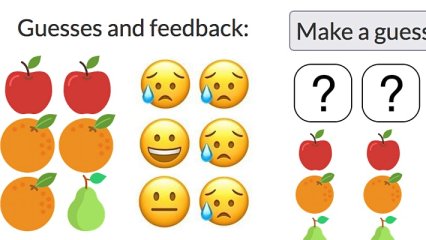
Hosts: Dr Jonathan Nelson, University of Surrey and Lara Betram, University of Surrey.
Who are smarter, people or machines? What is intelligence anyway? We learned about these issues while playing a code-breaking game, 'Fruit Salad Mastermind', in an interactive discussion with University of Surrey researchers.
In Mastermind, the challenge is to crack a hidden code, by making guesses and getting feedback. It is challenging to think of good guesses, and to make sense of the feedback that you receive. How people and computers identify good guesses, and make sense of the feedback, is a key issue for human and artificial intelligence.
Fresh from the Berlin Science Festival, Surrey researchers guided children, parents and teachers through the hands-on experience of playing Fruit Salad Mastermind online, trying to achieve the highest levels possible. They will brought their own experiences of the game to offer meaning and explained how this aids understanding of human and artificial intelligence.
They also discussed how Fruit Salad Mastermind can be used in schools as a fun experience to help children and young people learn about the mathematics of uncertainty including probability, entropy and information, and key principles in informatics.
Previous festivals
The Festival of Social Science events not only highlight the University of Surrey's contribution to some of the complex social questions of our time, they also illuminate how social sciences are key to the future health of our lives and communities.Dr Tamsin Woodward-Smith, ESRC Impact Acceleration Account Manager
Stay connected
Latest tweets
@ESRCimpact



